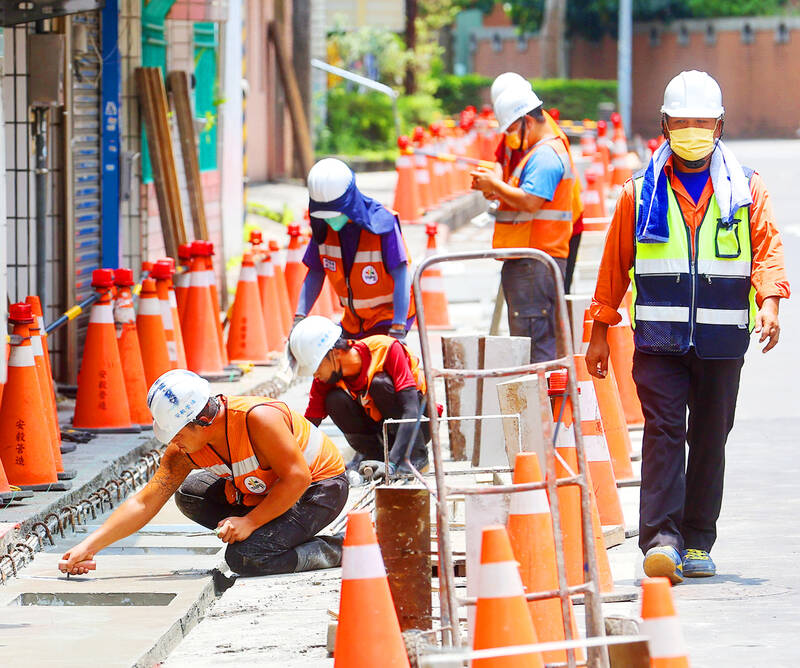The number of workers on official furlough programs fell by more than 1,400 during the past week as the tourism sector received a boost from eased border controls, the Ministry of Labor said.
Ministry-compiled data showed that the number of workers placed on furlough programs was 15,782 as of Monday, down 1,433 from 17,215 as of Oct. 31.
From Monday last week to Monday, the number of employers implementing unpaid leave programs also fell by 138 to 2,482 from 2,620 a week earlier, the data showed.

Photo: CNA
Department of Labor Standards and Equal Employment Director Huang Wei-chen (黃維琛) said that eased border controls and the lifting of the COVID-19 quarantine requirement for arrivals had helped boost travel agencies, airlines, and transportation and warehousing service providers.
The ministry said the number of furloughed workers in the support service industry, which is largely comprised of travel agencies, fell to 7,365 from 7,892 in the week, with the number of employers in the industry that had furlough programs in place also dropping to 1,395 from 1,427.
Huang said a large travel agency reinstated about 470 of its employees in the week, adding that the company had also developed new travel programs to allow its smaller counterparts to sell the products, a move which is expected to further help the industry.
During the week, the number of furloughed workers in the lodging, food and beverage sector fell to 1,029, and to 951 in the transportation and warehousing sector, from 1,161 and 1,184 a week earlier respectively, the data showed.
With eased COVID-19 restrictions boosting domestic consumption, the number of workers placed on unpaid leave programs in retail and wholesale businesses fell to 1,315 from 1,556, the data showed.
Huang said an eye-glasses retail chain terminated its furlough program by putting about 130 employees back to work during the week.
In the exports-oriented manufacturing sector, the number of furloughed workers fell to 3,970 from 4,149 as weakening global demand largely affected small and medium-sized manufacturers, although it was unclear whether large manufacturers would feel the pinch, Huang said.
The ministry updates its furloughed worker data on the first, eighth, 16th and 24th of every month, reporting unpaid leave numbers for companies that have registered their furlough programs with the ministry.
Most of the enterprises implementing furlough programs are small firms that employ fewer than 50 people.
Unpaid leave programs typically last for less than three months, with employees taking five to eight days of unpaid leave per month, the ministry said.

TRADE WAR: Tariffs should also apply to any goods that pass through the new Beijing-funded port in Chancay, Peru, an adviser to US president-elect Donald Trump said A veteran adviser to US president-elect Donald Trump is proposing that the 60 percent tariffs that Trump vowed to impose on Chinese goods also apply to goods from any country that pass through a new port that Beijing has built in Peru. The duties should apply to goods from China or countries in South America that pass through the new deep-water port Chancay, a town 60km north of Lima, said Mauricio Claver-Carone, an adviser to the Trump transition team who served as senior director for the western hemisphere on the White House National Security Council in his first administration. “Any product going

High above the sparkling surface of the Athens coastline, the cranes for building the 50-floor luxury tower centerpiece of Greece’s future “smart city” look out over the Saronic Gulf. At their feet, construction machinery stirs up dust. Its backers say the 8 billion euro (US$8.43 billion) project financed by private funds is a symbol of Greece’s renaissance after the years of financial stagnation that saw investors flee the country. However, critics see it more as a future “ghetto for the rich.” It is hard to imagine that 10km from the Acropolis, a new city “three times the size of Monaco”

STRUGGLING BUSINESS: South Korea’s biggest company and semiconductor manufacturer’s buyback fuels concerns that it could be missing out on the AI boom Samsung Electronics Co plans to buy back about 10 trillion won (US$7.2 billion) of its own stock over the next year, putting in motion one of the larger shareholder return programs in its history. South Korea’s biggest company would repurchase the stock in stages over the coming 12 months, it said in a regulatory filing on Friday. As a first step, it would buy back about 3 trillion won of paper starting today up until February next year, all of which it would cancel. The board would deliberate on how best to effect the remaining 7 trillion won of buybacks. The move

In a red box factory that stands out among the drab hills of the West Bank, Chat Cola’s employees race to quench Palestinians’ thirst for local products since the Gaza war erupted last year. With packaging reminiscent of Coca-Cola’s iconic red and white aluminum cans, Chat Cola has tapped into Palestinians’ desire to shun brands perceived as too supportive of Israel. “The demand for [Chat Cola] increased since the war began because of the boycott,” owner Fahed Arar said at the factory in the occupied West Bank town of Salfit. Julien, a restaurateur in the city of Ramallah further south,